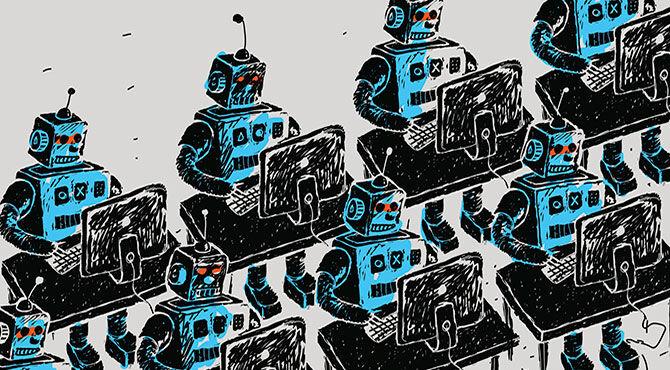Robots and AI 'pose risk to ten million UK jobs'
A recent report from PwC says that – although the UK has fewer jobs at risk from increased automation over the next 15 years than the US, Germany and Japan – around ten million jobs will be affected.

30 per cent of UK jobs affected by 2030
The report said that up to 30 per cent of existing jobs in the UK could be affected by AI by the 2030s with the transport and manufacturing sectors most at risk of seeing jobs disappear.Whilst PwC calculated that jobs in areas such as education, health and social work were least likely to be affected, the analysis found that men – especially those with lower qualifications – were more likely to see their jobs automated than women because of the sectors most at threat.But the report said that, over the long term, AI and robotics would not necessarily reduce total employment, with those most likely to benefit being those “with the knowledge and skills needed to thrive in an ever more digital economy”.'Social skills are less automatable'
John Hawksworth, chief economist at PwC, commented, “A key driver of our industry-level estimates is the fact that manual and routine tasks are more susceptible to automation, while social skills are relatively less automatable. That said, no industry is entirely immune from future advances in robotics and AI.“Automating more manual and repetitive tasks will eliminate some existing jobs, but could also enable some workers to focus on higher value, more rewarding and creative work, removing the monotony from our day jobs.“By boosting productivity – a key UK weakness over the past decade – and so generating wealth, advances in robotics and AI should also create additional jobs in less automatable parts of the economy as this extra wealth is spent or invested.“The UK employment rate is at its highest level now since comparable records began in 1971, despite all the advances in digital and other labour-saving technologies we have seen since.“It is not clear that the future will be radically different from the past in terms of how automation will affect overall UK employment rates.”Related news:
- New London black cab plant is simply electrifying!
- Relocation and automation – answers to immigration curbs?
- Business in the age of robotics
Jon Andrews, head of technology and investments at PwC, added, “There's no doubt that AI and robotics will rebalance what jobs look like in the future, and that some are more susceptible than others.“What's important is making sure that the potential gains from automation are shared more widely across society and no one gets left behind.”Commenting on the report, Employment Minister Damian Hinds said, “We have a resilient and diverse labour market in the UK, demonstrated by the latest record-breaking figures showing more people in work than ever before.“Whether it's in cyberspace or on the shop floor, advances in technology bring new jobs. It's only right that we embrace these opportunities, support new skills and help more people get into employment to secure a workforce of the future.”For related news and features, visit our Enterprise section.Access hundreds of global services and suppliers in our Online Directory
 Get access to our free Global Mobility Toolkit
Get access to our free Global Mobility Toolkit 
©2025 Re:locate magazine, published by Profile Locations, Spray Hill, Hastings Road, Lamberhurst, Kent TN3 8JB. All rights reserved. This publication (or any part thereof) may not be reproduced in any form without the prior written permission of Profile Locations. Profile Locations accepts no liability for the accuracy of the contents or any opinions expressed herein.






































